Plot: in the second season, Claire and Jamie Fraser travels to Versailles to scheme with Bonny Prince Charles.
Takes place: 1740's
NOTE: not all costumes are featured
Claire Fraiser
English-born Claire's wardrobe for her sojourn at Versailles is characteristically a mixture of luxurious fabrics but little adornment otherwise. Compared to Louise de Rohan, this difference becomes all the greater.
This mixture of yellow silk and an exquisitely embroidered petticoat would be more in the tune of fashion in the 1740's. Despite the lack of ruffles, bows etc. the dress would have been expensive enough due to the quality of the fabric and the work gone into the petticoat.
This gorgeous emerald-coloured robe à la Françaose would have been very simple by Versailles-standards - the tiny amount of ruffles at the neckline would be just too little ornament. However, the colour - albeit a tad dark - would have played well into the love of exotic colours at Louis XV's court.
While I have the impression that this red gown was a fan-favourite, it is completely wrong for Versailles. The main issue is the opening of the bodice. While the 18th century was a time when a woman's bossom was very much in focus (due to a combination of tight corsets and low necklines) this would have been too much. The gown is beautiful but an 18th century courtier would consider it to be an unfinished dress. Besides the cleft in the bodice it is also completely devoid of any type of ornament which would typically have been all the focus of the age.
Again, the costume is too simple compared to the time it is supposed to take place in. The cut is accurate, though, as it would have been the right length for a caraco or a pet-en-l'air.

This maternity gown is not far from what a deshabille would have been - a looser bodice but still in valuable silk. However, the lack at the engagents would not have been dyed black.

While absolutely beautiful, there is something odd about this gown. It seems that the skirt has been sewn onto a jacket and the gloves are overlapping the sleeves. Nevertheless, the embroidery and the lovely Bergère-hat are definitely appropriate.

James Fraiser
Jamie - like Claire - tends to stick to the darker shades. This suit would probably have been a few shades brighter if it was a genuine 18th century suit. Still the heavy embroidery on the waistcoat is very true to form. The cravat is a bit "rustic" but would not have been that out of place.
It is true that not everything worn by an 18th century courtier was made of silk; men's suits - especially the coats were often of velvet or rougher materials. However, the embroidery on this white coat would have been in a contrasting colour - the entire purpose was to show it off. The addition of the black belt is related to the story line, so there is no problem with that.

Speaking of contrasting embroidery, Jamie wears a good example - albeit somewhat colour-less - at a ball:
Bonnie Prince Charlie
Having lived at Versailles, Prince Charles Stuart definitely took to the fashion trends of his hosts. Heavy embroidery, brightly coloured silks, large buckled shoes and detailed buttons are all a part of his ensembles. The flower embroidery is realistic since florals were very much in - both for men and women.
Portraits appears to have been a source of influence for the costume designers which is very clear in this tartan-suit. Note how even the lavish gold border is replicated - this attention to detail is irresistible.
These colours are a perfect example of what was favoured by Louis XV's court - bright and lustrous. Pink (or salmon depending on how you see it) was not reserved for females - it was a time before all that.
Louise de Rohan
A true French aristocrat, Louise de Rohan's dresses are very true to what real women at Versailles would have worn. Ostentatious and lavish, her wardrobe is primarily of silk and is decorated with an abundance of bows, ruffles and lace.
This robe à l'Anglaise depicts a silk gown with a large floral pattern - quite in mode at the time. The second photo beautifully shows of the engageants at the sleeve with the delicate lace underneath. Notice the row of bows at the bodice; this and the choice of colour resembles those worn by Madame de Pompadour in her portraits.
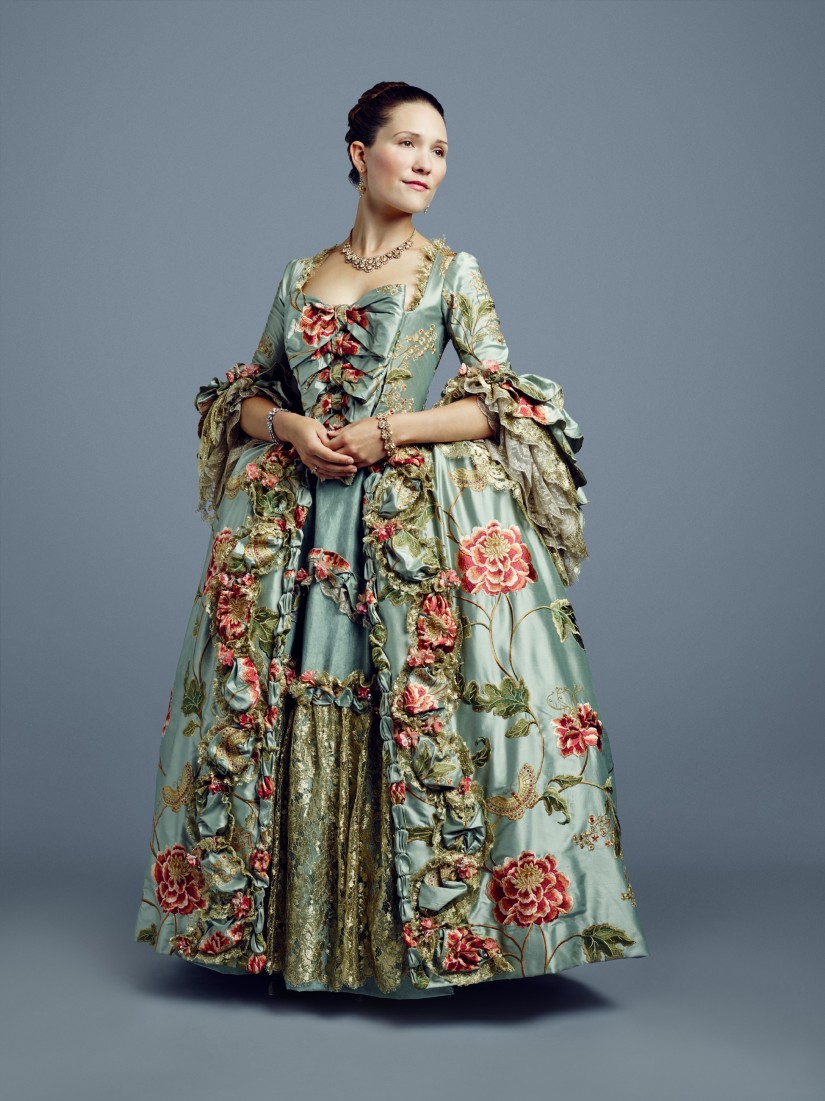
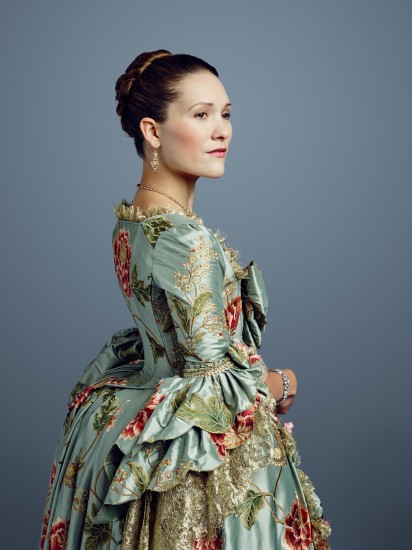


Once again, my name-sake brings all the ruffles to the bodice - and adds a golden trim. Especially interesting is the lace around the neck. The 1740's was a transition period when it came to accessories. Jewels were still popular but lace and pearls were increasingly worn - even at formal occasions.
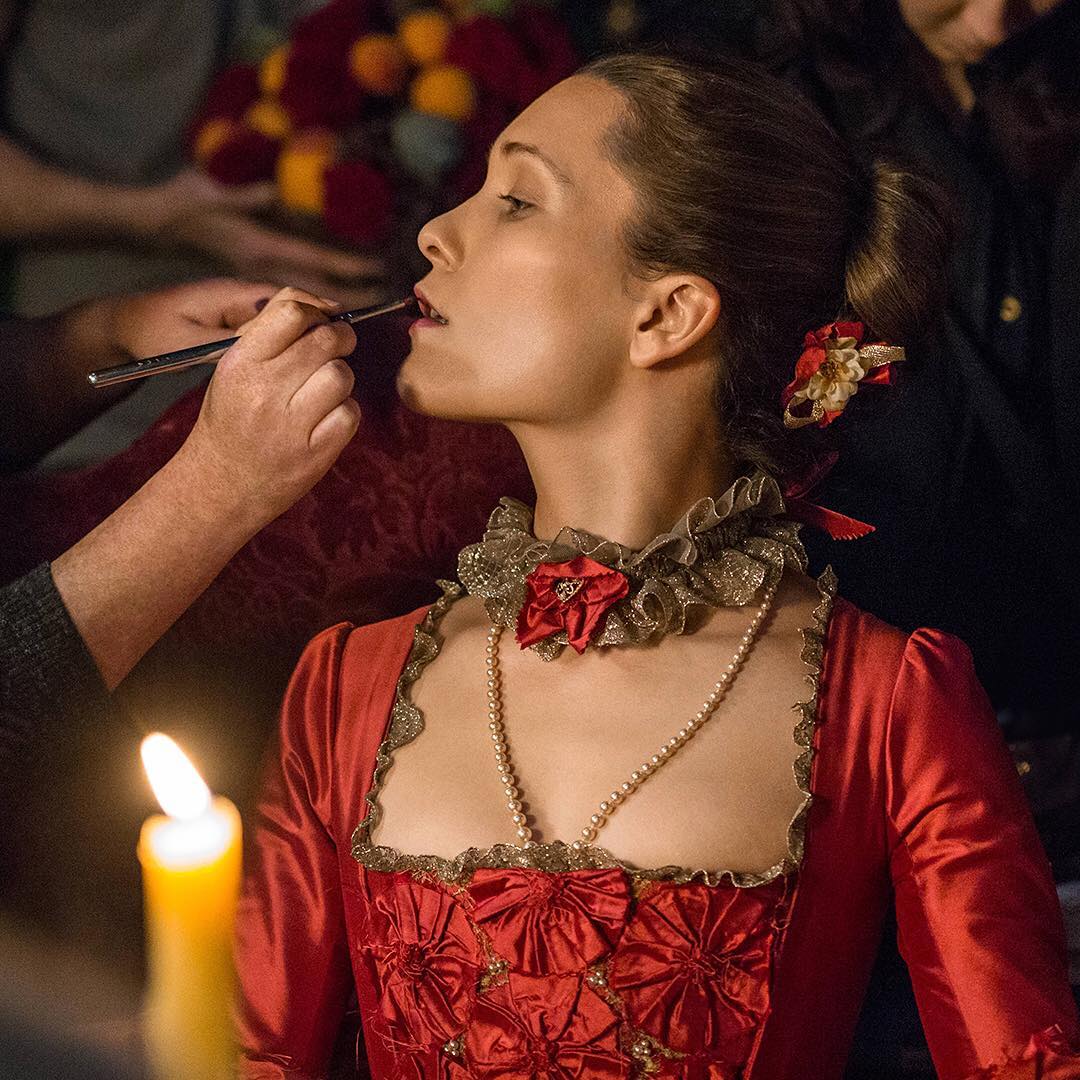
Louis XV
Although his role is limited - and pretty unlike a gentleman - it was impossible not to include Louis XV.
The golden suit is perfect for the king of France. Everything from the intricate lace in the cravat to the lavish gold-thread embroidery and the (apparently) diamond encrusted buttons are perfectly realistic. The only thing that stands out is how metallic the breeches looks - it almost looks a bit too modern.
Considering the extravagance of the military uniforms, Louis' certainly lives up to his rank. The red and blue uniforms of his guards are equally true to form.

The pattern of this banyan is slightly odd but could be imagined to be imported from the Far East - that was popular at the time. Notice that his shoes match the pale red of the banyan.

Mary Hawkins
There is something violently English about Mary Hawkins (besides her name). Compared to her more flamboyant, French counterparts her gowns are of a far more subdued colour palette. This could also be attributed to the fact that she was unmarried for a good deal of the season.
Although far more practical, this dress would hardly be approved at Versailles. It is far too simple but the bodice is strange. Rather than an actual bodice a scarf is merely held in place by two straps - I have never seen a gown from this period that looks anything like it. However, the straw hat is on mode.
Comte de Saint-Germain
The Comte is portrayed (by a man who has previously played Louis XV) as a wealthy courtier and he would certainly have had to be to afford a wardrobe like his. Not only is his coat of silver silk brocade, it is also lined with fine lacing and his waistcoat is similarly silver lined.
The lighting in the photo below makes the coat look almost purple while it is in fact blue - which is obvious from the other photo. Still, there is no lack of gold embroidery or even a contrasting pattern on the waistcoat. The Comte has changed his waistcoat for a bright yellow one, too, in the second photo.
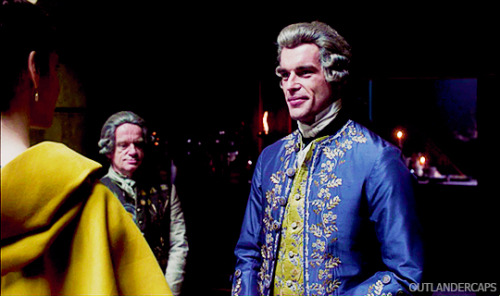
and finally...
I could not resist including this gem. It reminds me a great deal of this genuine 18th century gown of the same period





















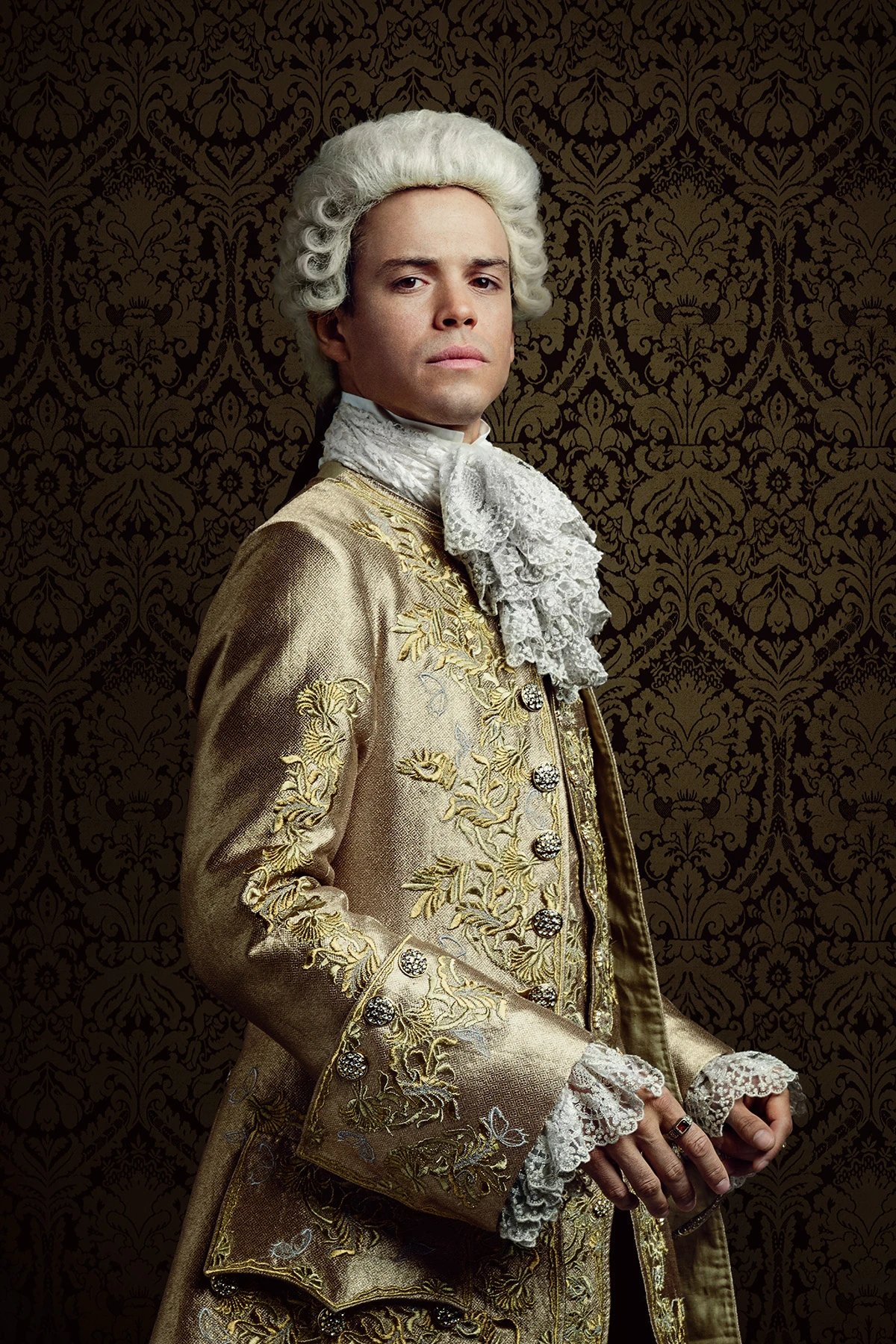
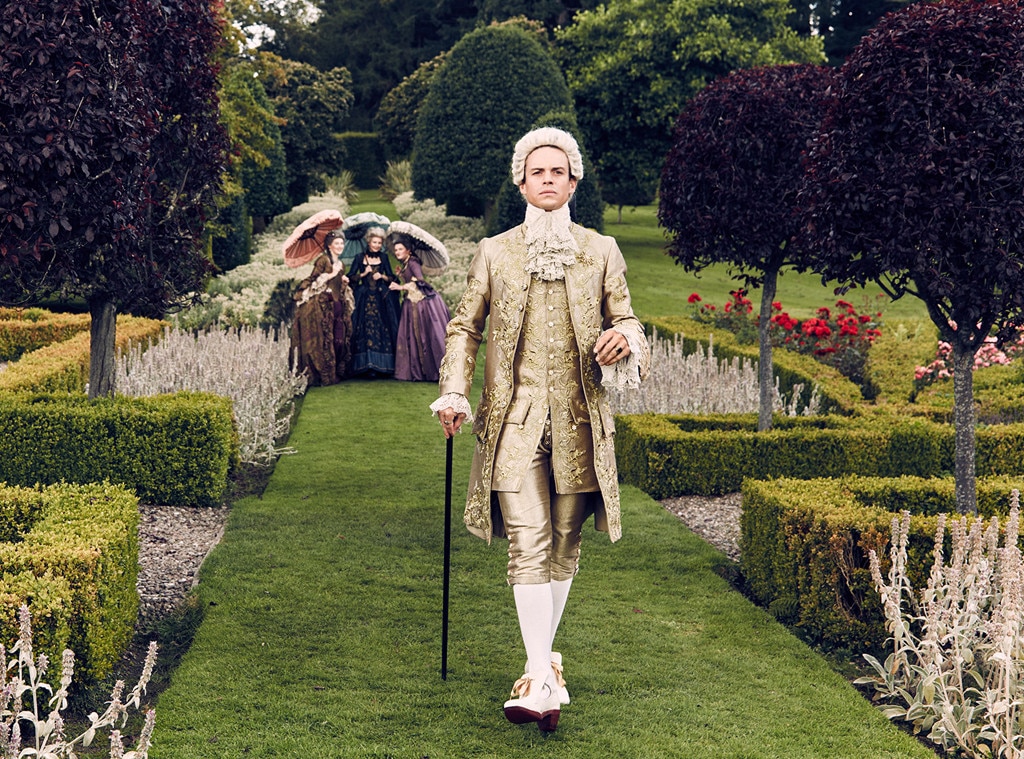
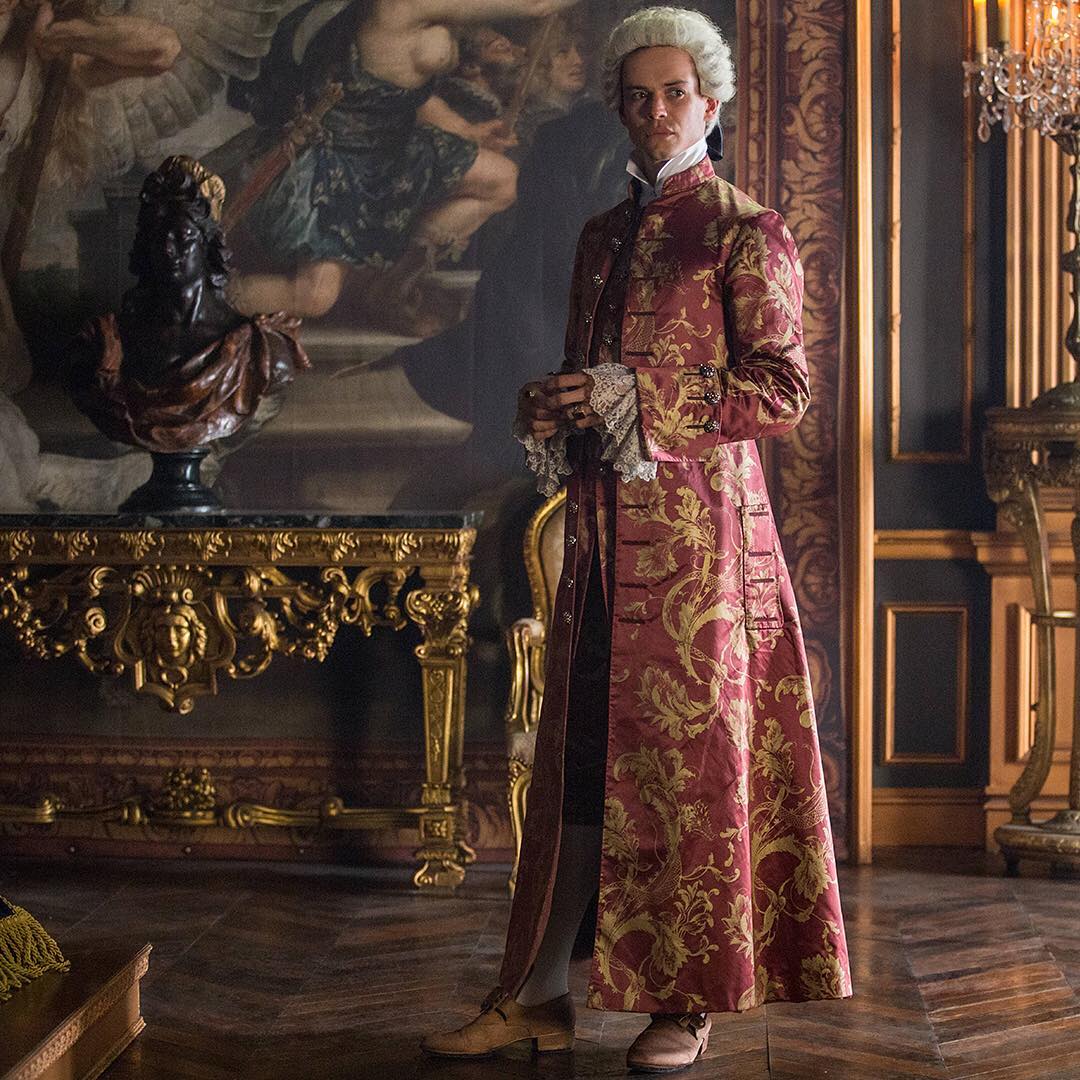


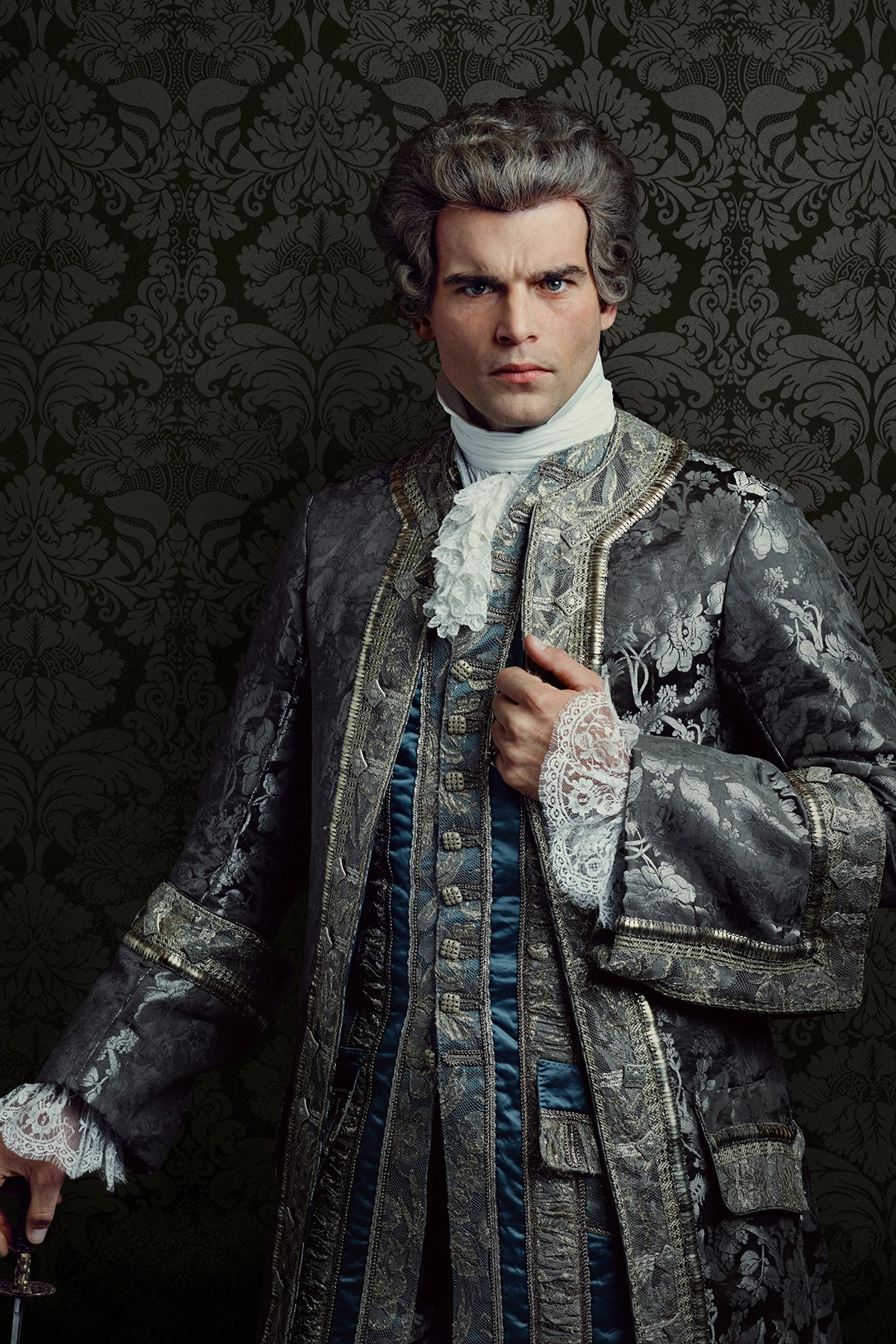
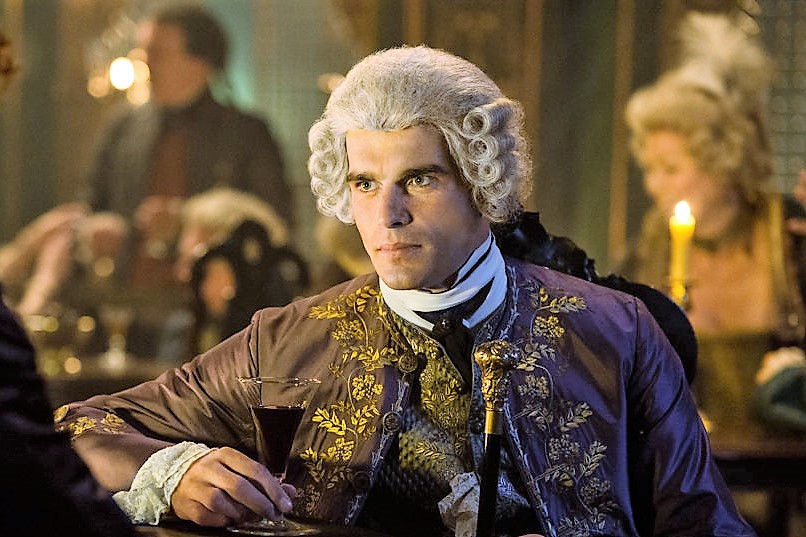


Is it true that anyone could visit Versailles in the 17th and 18th centuries? Arthur Young said that when he was visiting Versailles, he saw two paupers dressed in rags walking freely around the King's appartements.
ReplyDeleteYes, that is true. It was considered a basic right of all the king's subjects to be able to see their king and they were generally allowed to go through the royal apartments
DeleteLove the embroidered designs.
ReplyDelete